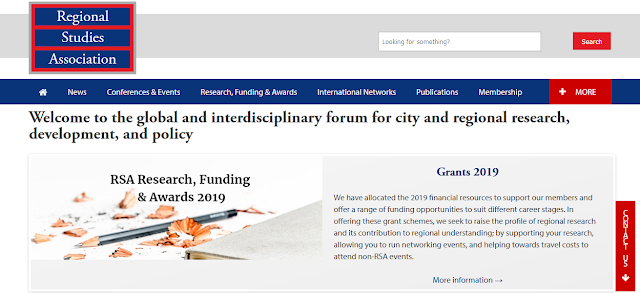7th Master Class on EU Cohesion Policy for PhD Students and Early Career Researchers 2019
7th Master Class on EU Cohesion Policy for PhD Students and Early Career Researchers 2019
Deadline: May 1, 2019.
Applications are open for the 7th Master Class on EU Cohesion Policy for PhD Students and Early Career Researchers 2019. As
part of the 17th European Week of Regions and Cities, the biggest event
worldwide on regional and urban development, the Master Class on EU
Cohesion Policy will be held for PhD students and early-career
researchers for the seventh time.
Applications are being sought from PhD students and early career researchers (defined as being within five years of the date on their PhD certificate or equivalent) undertaking research related to European Cohesion Policy to attend the 2019 University Master Class.
The Master Class is a unique format to connect aspiring researchers and will include presentations of papers by the participants as well as lectures and panel debates with policymakers, EU officials and senior academics from throughout Europe to improve understanding of, and research, on EU Cohesion Policy. In particular, the Master Class will serve to:
For more information, visit 7th Master Class on EU Cohesion Policy.
Applications are being sought from PhD students and early career researchers (defined as being within five years of the date on their PhD certificate or equivalent) undertaking research related to European Cohesion Policy to attend the 2019 University Master Class.
The Master Class is a unique format to connect aspiring researchers and will include presentations of papers by the participants as well as lectures and panel debates with policymakers, EU officials and senior academics from throughout Europe to improve understanding of, and research, on EU Cohesion Policy. In particular, the Master Class will serve to:
- discuss recent research on European regional and urban development and EU Cohesion Policy;
- enable PhD students and early career researchers to exchange views and network with policymakers, EU officials and senior European academics; and
- raise awareness and understanding of the research potential in the field of EU Cohesion Policy.
Cost
- Cost of travel and accommodation will be covered for selected applicants
Eligibility
- Open to PhD students and early career researchers from EU Member States and non-EU countries;
- Early career applicants must be within 5 years of finishing their PhD on May 1, 2019 or demonstrate equivalent experience;
- Candidates who have participated in a previous edition of the Master Class are not eligible to apply;
- Only one application per person will be considered;
- The organisers will cover and arrange travel and accommodation of all selected participants;
- There is no fee to attend the Master Class;
- Applicants do not need to be members of the learned societies involved in the Master Class;
- Participants must attend the full programme and engage actively in all aspects of the Master Class. If participants who fail to attend the full Master Class, they must reimburse costs for travel and accommodation paid and no certificate will be given.
Selection Criteria
Applicants will be invited to attend the Master Class based on:- their academic background and achievements;
- the quality of their application and the paper abstract they submit; and
- the broadest possible geographical and gender balance.
Application
Applications must complete the application form and include an abstract that falls under one of the following three broad themes:- The Future of the EU and the roles of the Regions and Cities #EUBudget #Cohesion #Post2020 #ERDF #Subsidiarity #Democracy #Demography #InternationalCompetition #Digitalization
- A Europe Closer to Citizens #TerritorialCohesion #Cooperation #People #Places #Urban #Rural #LocalCommunities #Migration #AdministrativeCapacity
- A Greener Europe #EnergyTransition #ClimateChangeAdaptation #CircularEconomy #RiskManagement #EuropeanSolidarityFund
- the completed application form, your CV combined in one document (WORD or PDF) submitted via the online form;
- a certificate (uploaded in a separate PDF or WORD document) submitted via the online form: proving the PhD student status; or proving early career status (PhD certificate);
- a portrait photo (uploaded in a separate file) submitted via the online form;
- an academic reference in support of your application must be sent separately by the referee to Klara Sobekova at office@rsaeurope.org and be received by the closing date.
For more information, visit 7th Master Class on EU Cohesion Policy.




Comments
Post a Comment